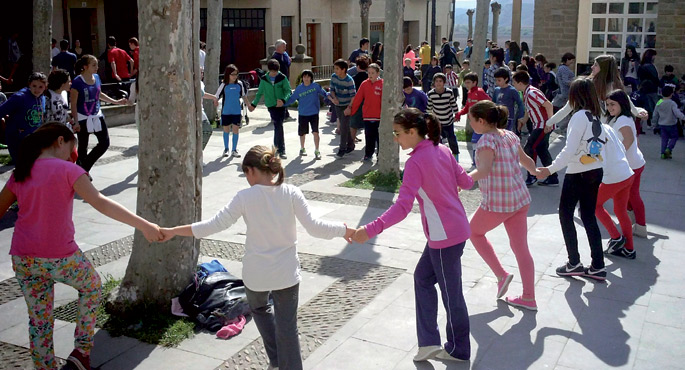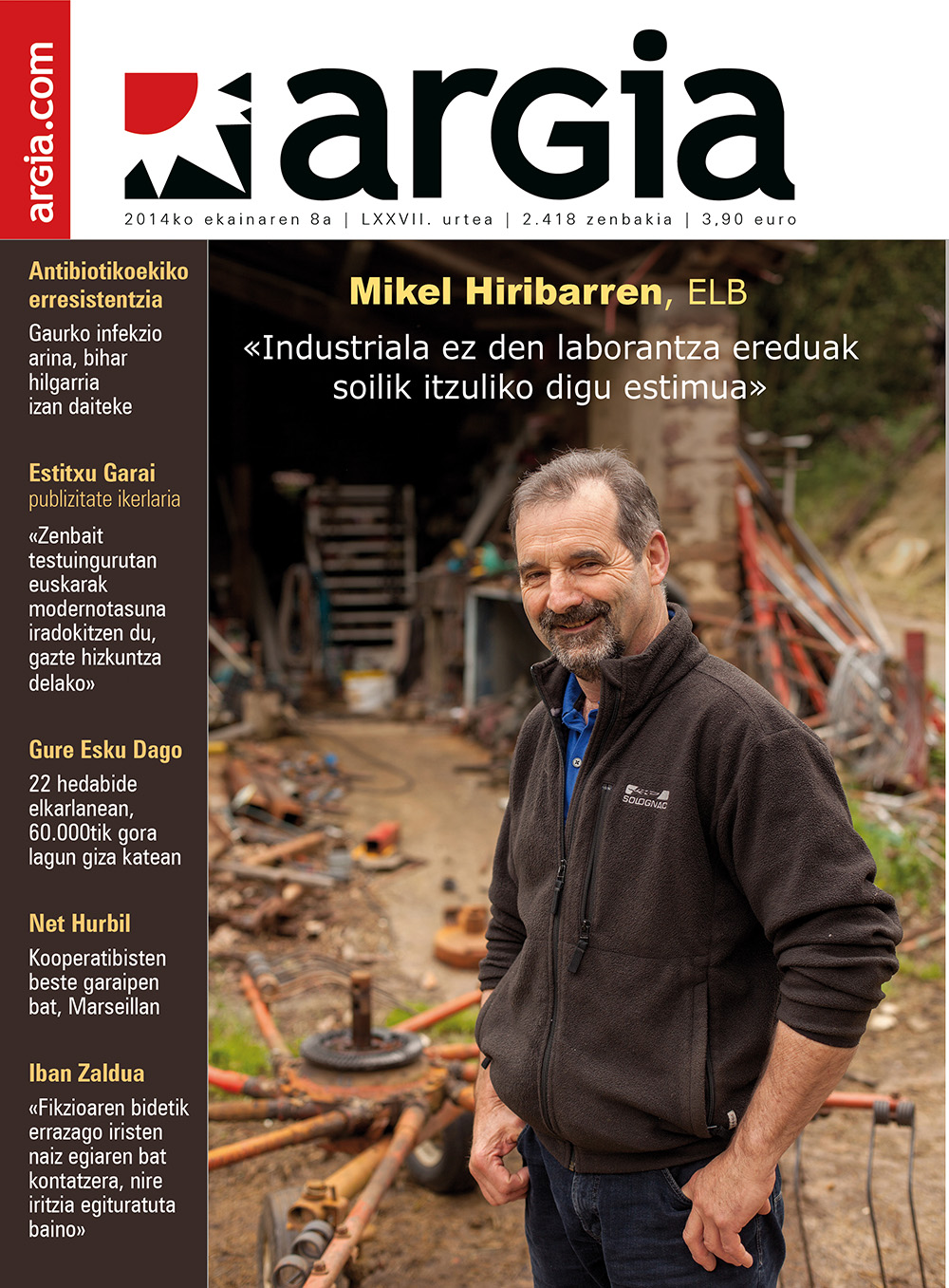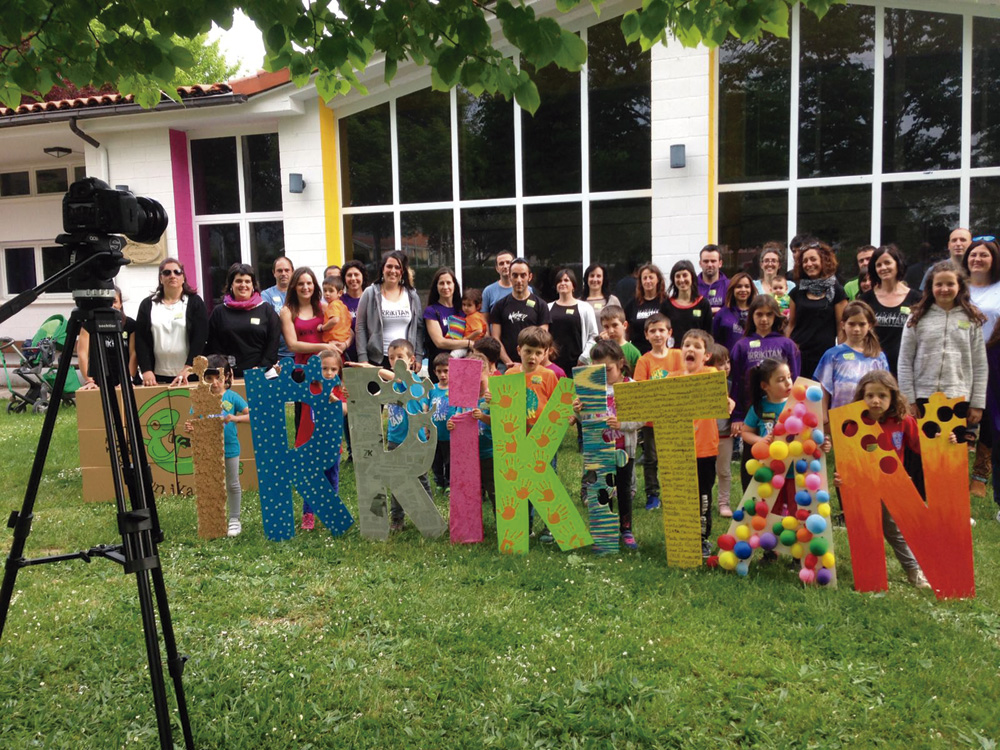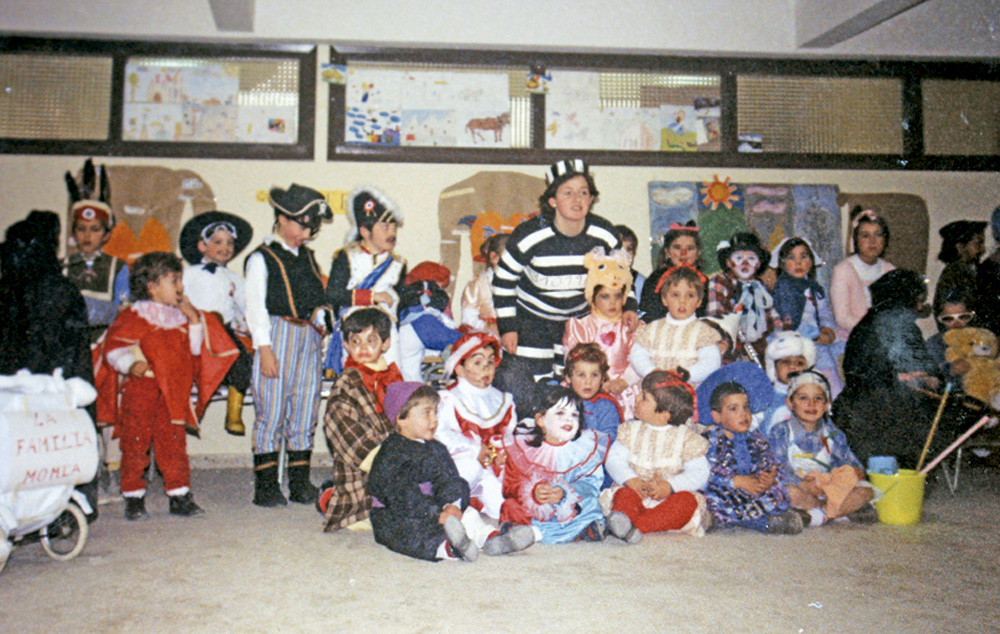Elkarkidetza, learning from each other
- At the ikastola Assa (Lapubs of Labarca), in charge of organizing this year’s Basque Country, three years ago they began working in the association. The goal is for boys and girls to learn together and work together on subjects, norms, autonomy, evaluation...

The day we approached Assa, they are immersed in Cultural Week. They have stopped recess for a moment and have taken their turn to the football field, dancing from the youngest of 3 years to the young of 17, in addition to the teachers. In the constant relationship they seek with the people, they have made some essays in the town square, as well as the proclamation of the Cultural Week, read by Argitxo. The older ones have taught to dance to the younger ones, and have also performed activities such as competitions and pintxos tastings, free student exhibition, potato tortilla competition, music performances based on glasses, student concerts… In the same way they work the rest of the special days there are throughout the year: Basque Day, like the Olentzero or carnivals. And of course, this year’s Araba Euskaraz: students, teachers and parents meet every Thursday.
Another interesting experience that is based on coexistence is reading: In Primary School, couples work, mixing 2nd and 4th grade students. To this end, several teachers from the centre have received prior training.
Training
The offer was extended by the Erkide cooperative society and a total of twelve teachers (one third of the faculty) received 40 hours of training at HUHEZI during the 2010-2011 course. They're still accompanied by a tutor. At ikastola Assa there are about 370 students, and as explained by Professor Idurre Arrieta, the education of elementary school teachers in pedagogy and that of ESO or Bachillerato professors is very different. The latter are not so trained in the pedagogical field. In any case, the course was well received by all, and since the collaboration began, year after year they have been improving and developing this line.
Arrieta has the following challenge clear: to integrate the collaboration in daily life without having to be tied to special projects or days. That the students be able, depending on their abilities, to work as a team in the subjects of daily life, instead of working individually and then getting together. To this end, the development of standard materials is gradually being modified.
In Primary, for example, they mainly use Txanela materials. The students take the subjects and present them in groups. In the Baccalaureate they must work and present a theme of the agenda in the same way. They first use different techniques to form groups, depending on the activity: it can be random, it can be about “experts” (according to the knowledge of the members on a specific topic), sub-themes and sub-works to be developed… Pre-elaboration is very important to balance the groups the best posible.Por example, a
Bachillerato classroom has developed a health guide in a triptych that has been presented to Elementary students. Previous work has been very important and have dealt with subthemes such as sport, emotions, health… From there, they have formed groups of experts and have discussed what to include and what not in the triptych, creating group dynamics and seeking consensus from the argument and respeto.En Elkarkidetza’s philosophy, the evaluation is also in the hands of the students, is evaluated every day, the team’s work is evaluated in its team.
The final grade is placed by the students, and although often the prejudices say that if the students self-evaluated they would always “10”, Arrieta explains that they are honest and rigorous when given prominence.
Doubts
Among those who are motivated by education, one of the concerns is projectism, the feeling of jumping from one project to another. In addition, questions such as “Was everything done before useless?” can lead the educator to skepticism. Idurre Arrieta says that we have to change our attitude and our thinking: How will I take this issue to the class? How do you focus? The teacher has to accept that he is not the master and the master in class, who sometimes just has to be helper.
There are more questions: how to bring the topics to the cloister, how to explain them to the parents, what they arise in each of the works… But, as we have said before, a tutor accompanies them to solve the doubts together.
All this has allowed over these three years to develop the project in multiple areas: increasing the involvement of students, improving the evaluation, or incorporating students with special needs.
The ikastola, stronger
A few years ago, many young Riojans did not see much need to study, around the vineyards there was the possibility of developing their work and their life. Today, the situation has changed: a crisis that has spread everywhere, due to the displeasure or specialisation of young people in the vineyard (nowadays, to manage a vineyard, we have to train in different areas). We cannot ignore the work that the ikastola has done to raise the awareness of families and young people. In addition, as Arrieta explained, if the students are happy in the ikastola, they will learn, if they are involved, what they will do. During all these years the ikastola has won in the same Lapufog and in the villages of alrededor.El project of
Elkarkidetza and the ikastola Assa in general reflect very well the call of this year’s Araba Euskaraz: illusion. The first Araba Euskaraz was made in Lapufog in 1994, where and on the border! The motto was, the periphery, then the Ale, comes loaded with crops in 1999, a sign that it was working on parts and crops. On this occasion, the message lives on the border: after the clamour and abandonment, today in the Rioja Alavesa, the ikastola Assa and the Basque Country are alive.
As of 15 June, special attention has been paid to the region: At Ikastola Assa there are students from 27 towns that carry out activities without interruption: txaranga, acoustic tour, diaporamas, bertso-food, rock concerts, oil tasting... Foster collaboration between Ikastola and the environment.
Ekainaren 17an ospatuko dute Araba Euskaraz Argantzunen. Bertako ikastolak Manzanosen duen Lehen Hezkuntzako eraikina ordaintzen laguntzeko baliatuko dute jaia.






















